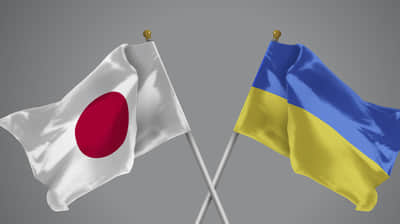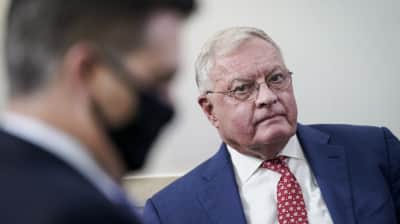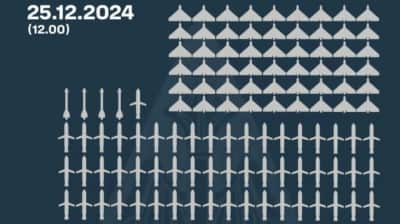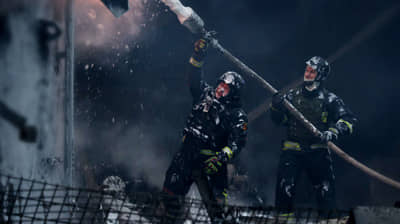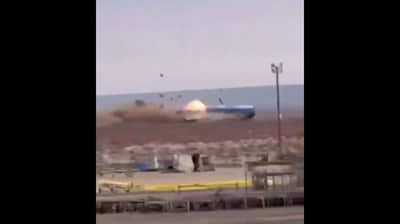Russians have destroyed the Tauric Chersonese World Heritage Site in Crimea. Now they "consecrate" the theatre built in its place – photo
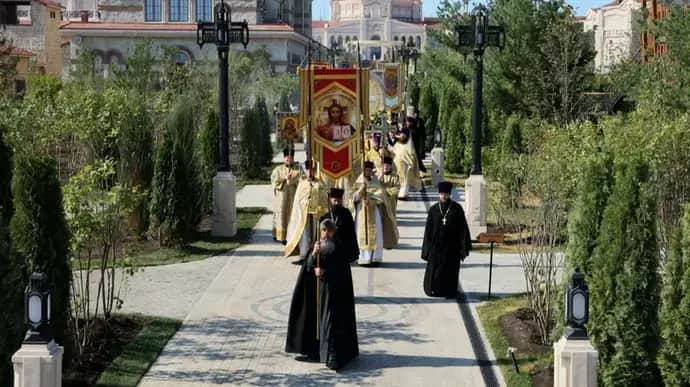
Roads near the Tauric Chersonese National Reserve in the city of Sevastopol, Crimea, were closed to traffic on 28 July. The Russians had announced the "consecration of a new building" – an open-air theatre built in place of a genuine landmark of global significance.
Source: Krym.Realii (Crimea.Realities, a Radio Liberty project)
Details: A correspondent from Krym.Realii has reported that the Russians have officially opened a museum and church complex called New Chersonesos. The ceremony was not open to the public, but church leaders from the Crimean diocese, a church choir, and representatives of the city's Russian authorities were invited.

Quote: "The roads leading to Chersonesos were closed, and police patrols armed with machine guns were set up at the junctions. Public transport was prohibited to go to Chersonesos, and routes were diverted to bypass the usual route," a journalist said.
Collaborator Sergey Aksyonov, the self-proclaimed leader of the Crimean occupation authorities, said the ceremony had been planned to coincide with the Day of the Baptism of [Kyivan] Rus.
"Chersonesos is the cradle of a thousand years of Russian history, one of the main symbols of our civilization. Here the holy prince Vladimir [known to Ukrainians as Volodymyr – ed.] was baptised, here are the spiritual origins of the Russian world. Here is not only our past, but also the future," Aksyonov wrote.
Sevastopol residents will be permitted to enter the territory of New Chersonesos from 30 July onwards. However, entry will only be allowed by prior arrangement through an electronic queuing system. The Russian authorities have given no reason for this decision. It is also unclear how elderly people who do not use computers or smartphones can visit Chersonesos.
What's wrong with New Chersonesos
In early summer, it was revealed that a new open-air theatre had been constructed on the site of ancient excavations in the Tauric Chersonese Reserve. Furthermore, many of the reserve's old structures have been replaced by new ones, destroying its authenticity.
In 2015-2016, developers constructed observation platforms such as towers, walls and columns to surround the ancient remains at ground level. Later an open-air theatre was built on the location of the ancient fortress, adding approximately one tonne of weight to the antique structure. All of the works were overseen by the Russian authorities and the Russian Federation's Ministry of Defence.
Most of the artefacts found on the site, including frescoes, dishes, household items and icons, were taken to museums in Russia. Then the New Chersonesos archaeological park began to be built in place of the remains of the necropolis.
A new town has effectively been built on top of the archaeological ruins. The archaeological park contains old finds, and the numerous objects that were excavated were eventually relocated and rebuilt elsewhere. The Russians have built the Cathedral of St Vladimir, which is subordinate to and consecrated by the Moscow Patriarchate, on the location of the settlement. The Church also claims 24 sites from the Chersonesos Historical and Archaeological Reserve, representing nearly the entire museum complex.
Tauric Chersonesos is a unique historical landmark from ancient times. Studies of these edifices have identified a system of organisation and planning dating back to that era. The Greek urban planner Hippodamus designed the polis, and the construction plan is based on a network of longitudinal and transverse streets that meet at right angles to form neighbourhoods. This is the only historic site in Crimea of international significance.
Support UP or become our patron!
